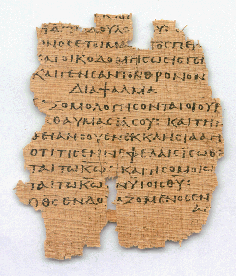 Dear reader, before you attempt to read this article please take a moment to pray, meditate, & ask yourself this question, “Am I willing & ready to accept that God can & does do things for His own purposes & His own glory...even things I may find difficult, painful, & maybe even repulsive?” Dear reader, if you are unable to accept this, then this article may not be for you. God certainly endowed humans with emotions but when approaching such topics as this one, we should not approach with emotionalISM. We should & we MUST allow the Scriptures to speak & go no further.
Dear reader, before you attempt to read this article please take a moment to pray, meditate, & ask yourself this question, “Am I willing & ready to accept that God can & does do things for His own purposes & His own glory...even things I may find difficult, painful, & maybe even repulsive?” Dear reader, if you are unable to accept this, then this article may not be for you. God certainly endowed humans with emotions but when approaching such topics as this one, we should not approach with emotionalISM. We should & we MUST allow the Scriptures to speak & go no further.
The question of the salvific state of infants is fraught with emotionalism. Who wants to think that a baby, whom we think as innocent being consigned at death to any other place than heaven? Surely, we say to ourselves that God will not...cannot hold anything against a baby. The argument goes, that to think of God as doing anything but giving babies an automatic pass into heaven would be to think of God as some sort of monster. What does the Bible say, if anything on the state of babies in death?
Perhaps the most referenced text is 2 Sam 12:22-23.
And he said, “While the child was alive, I fasted and wept; for I said, ‘Who can tell whether the LORD will be gracious to me, that the child may live?’ But now he is dead; why should I fast? Can I bring him back again? I shall go to him, but he shall not return to me.”
This comes from the account of King David who God said was being punished by having his child die because David stole another man's wife & the baby was the result of David's relationship with the woman. David held out hope by fasting & praying that God might not take the child, but in verse 22 David tells his servants why he stopped his supplication upon hearing that the child had died.
The point we are supposed to get from this, so says the advocates of automatic infant salvation is that David says, “Can I bring him back again? I shall go to him, but he shall not return to me”. The inference is that David is going to go where the baby is & that since we are to understand that David will go to heaven when he died, so the baby must have gone to heaven. It seems logical enough.
But is that what the verse is actually saying? And if it was, does it mean ALL babies go to heaven automatically? Rather, the Jews had a concept much like Roman Catholicism's concept of purgatory – a temporal state BEFORE heaven, before the judgment. We see this in the parable Jesus related about the Rich Man & Lazarus in Luke 16:19-31.
So it was that the beggar died, and was carried by the angels to Abraham’s bosom. The rich man also died and was buried. And being in torments in Hades, he lifted up his eyes and saw Abraham afar off, and Lazarus in his bosom...And besides all this, between us and you there is a great gulf fixed, so that those who want to pass from here to you cannot, nor can those from there pass to us.’ Lk 16:22-23, 26
This is an account of a rich man & a poor man that upon their mutual deaths, one goes to a temporal place of torment & the other to a place to be with father Abraham. Neither were in actual “heaven” but rather in a place called “Hades” & a place called “Abraham's Bosom”. (see reference links)
So, understanding the Jewish concept of what happens at death, we can see that David could easily say that he will go where his dead child is, even if the child goes to one place & David to another -- the concept of death was to “go to the grave” -- the place of death.
Another text I've seen used to say that infant salvation is automatic is 1 Cor 7:14
For the unbelieving husband is sanctified by the wife, and the unbelieving wife is sanctified by the husband; otherwise your children would be unclean, but now they are holy.
We are supposed to infer that children are made holy or “sanctified” automatically. First, there is a problem with how some people understand sanctification, it is NOT a synonym for being saved. Otherwise reading the text again, we could suppose a non-believing spouse is automatically “saved” by the belief of a believing spouse. The verse is not saying that. Sanctification is a position of grace. An unbelieving spouse & the children of a believing spouse will share in the benefits & extended grace of the believer. Just being around the believer will bring benefits to the unbelieving, BUT it does not save the unbelievers – neither the unbelieving spouse or children.
So, is there any place in the Bible that tells us what happens to babies who die? No, not specifically. When addressing the inherited sinful nature of mankind, the Bible doesn't classify people as babies, toddlers, teenagers, & adults. The newborn baby is as “guilty” of the sinful nature, even if not of individual sins as is the 120 year-old. We must keep in mind the Bible when addressing sin is not usually addressing individual actions as much as it is addressing the overall nature of mankind.
Some texts that talk about this are:
The wicked are estranged from the womb; They go astray as soon as they are born, speaking lies.-- Psalm 58:3
This verse shows that at least someone is considered wicked from the womb, even before they are born & as soon as they are born they are wicked as well. So the least we could say if this were the only verse, is that not all babies are born innocent. But there is more.
God speaking of an entire group of people says,
Surely you did not hear, Surely you did not know; Surely from long ago your ear was not opened. For I knew that you would deal very treacherously, And were called a transgressor from the womb. -- Isaiah 48:8
The “innocent at birth” concept isn't looking so accurate when the Bible is opened upon the topic. Perhaps the pivotal verses are found in Romans 9 in the account a woman giving birth to twins & the state of the twins even before they were born:
...when Rebecca also had conceived by one man, even by our father Isaac 11 (for the children not yet being born, nor having done any good or evil, that the purpose of God according to election might stand, not of works but of Him who calls), it was said to her, “The older shall serve the younger.” As it is written, “Jacob I have loved, but Esau I have hated.” -- Romans 9:10-13
How can this be? How can God favor one person over another before either was born & had done anything “good or evil”? Even that is answered in the following verses:
What shall we say then? Is there unrighteousness with God? Certainly not! For He says to Moses, “I will have mercy on whomever I will have mercy, and I will have compassion on whomever I will have compassion.” So then it is not of him who wills, nor of him who runs, but of God who shows mercy. -- Romans 9:14-16
It is clear from the Bible that at least not ALL babies are automatically “innocent” & that God can & does have plans & purpose for people even BEFORE they are born.
But to open up the issue more, for the people who claim all babies automatically go to heaven at death, think about what this means. It means for one, that perhaps abortionists have sent more people to heaven than all the evangelism in history. It means (as despicable as it sounds) that the way a person could insure their children go to heaven would be to kill them before they reach some fictitious “age of accountability”.
Historically, the Church has taught differing things about the state of babies at death...differing only in degree, but not scope. The Roman Catholics taught a “limbo” for infants who were not baptized before death, often referred to as limbus infantium but have recently been declaring that there is no such place. (see link)
Augustine, whom has influenced much of our Reformed Christian heritage took the approach in the 418 Council of Carthage that babies shared in the misery of mankind's fallen state – meaning babies DIDN'T automatically go to heaven at death. Ambrose & Aquinas also advocated that babies do not automatically go to heaven but that if they did go to hell, they didn't suffer as much or any pain as would an adult.
The Reformed view, which has been strongly based on the Falleness of mankind & the rejection of some neutral state has moderated over the years but originally held that the children of the Elect (Christians) automatically go to heaven.
Since we are to judge of the will of God from his Word, which testifies that the children of believers are holy, not by nature, but in virtue of the covenant of grace, in which they, together with the parents, are comprehended, godly parents have no reason to doubt of the election and salvation of their children, whom it pleaseth God to call out of this life in their infancy. (1619 Canons of Dort 1:17)
Or from later, the Westminster Confession of Faith 1646,
Elect infants, dying in infancy, are regenerated and saved by Christ through the Spirit, who worketh when, and where, and how he pleaseth. So also are all other elect persons who are incapable of being outwardly called by the ministry of the Word. (WCF 10:3)
The overall sentiment by the Reformers is that while the infants of non-believers MAY go to hell, the children believers do automatically go to heaven.
In conclusion, though many people & even Christians presently have trouble believing that God might consign ANY infant to hell, the Bible & Christian theology has shown that not ALL infants are automatically saved...but that Christians have, either out of emotionalism or/& out of a desire to see God as merciful in this regard, at least give deference that people dying in infancy are most likely automatically saved. The matter is ultimately speculation.
See also:
-
http://www.freerepublic.com/focus/f-religion/1245734/posts
-
http://homepage.mac.com/macfhionn/FREUMH/Cubaid/NMF/BEURLA/Caochla/InfancySaved.html


